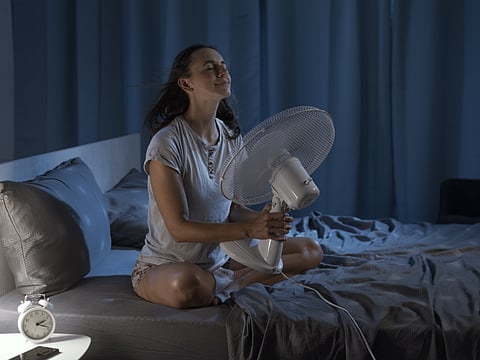Fan or foe? How the all-night cool breeze could harm your breathing and muscles
Can your fan cause muscle cramps and allergies?

For most of us, especially in the UAE summer, turning off the fan at night feels like a mild form of torture. Just the thought of lying in bed without the cooling breeze or that soft, comforting whir is enough to break a sweat. And the science actually backs you up, research shows that cooler sleeping environments (around 18–22°C or 64–72°F) help regulate core body temperature and improve sleep quality. Fans, in that sense, are a budget-friendly way to chill down.
But please forgive us for raining on your cool parade: Sleeping with a fan on all night might come with risks. Some, some minor. Some more serious. We've asked the experts and yes, the science is solid.
The health concerns: What are the risks?
Fans blow air that dries out your skin, nose, and throat, explains Dr. Gokul Divakaran, Specialist ENT at Aster Clinic, Halwan, Sharjah. “In already dry indoor environments, such as many air-conditioned homes here, sleeping with the fan running all night can lead to excessive dryness in the mucous membranes. So, this results in waking up with a sore throat or dry nasal passages.”
Basically, the continuous airflow evaporates moisture not just from your skin but from delicate tissues inside your nose and throat. If you’re already battling dry air from air conditioning, the fan can intensify this effect.
It can even worsen dehydration or allergies overnight
The bad news doesn’t quite stop there. As Divakaran and Sushma Sahni, a Dubai-based ENT specialist explains, “Yes, fans can worsen allergies and dehydration overnight. Besides drying out your airways, fans stir up dust, pollen, and other indoor allergens that settle on surfaces,” adds Divakaran.
Most of the time, people are in a naturally dusty environment, so many people are already prone to allergic rhinitis or sinus issues. And here’s a common oversight: “Poorly cleaned fan blades and AC vents are often sources of these allergy triggers,” adds Sahni.
The risk of muscle cramps and stiffness
You’ve probably heard someone complain about waking up with a stiff neck or back after sleeping with the fan pointed directly at them. Dr. Divakaran agrees this is common: “This Prolonged exposure to cool air blowing on your body, especially your neck or back, can cause muscle stiffness.”
He explains further: When cold air hits your muscles for an extended period, it can cause vasoconstriction, which means the blood vessels in that area narrow. This narrowing reduces blood flow and can lead to a sensation of tightness or tension in the muscles. Think of it like your body trying to conserve heat by limiting circulation in that spot.
Additionally, the cold air causes localised chilling, cooling the muscle tissue and surrounding area. When muscles get cold, they tend to contract or tense up as a natural protective response, almost like shivering. This tension can feel like stiffness or sometimes even lead to mild cramps.
The problem becomes worse during sleep because your body stays relatively still for hours. Lack of movement means that muscles don’t get the usual circulation boost from shifting positions. Without that, the chilled, tightened muscles don’t get warmed back up, which can leave you waking up feeling sore, stiff, or uncomfortable.
So while a fan might feel refreshing at first, if it blows constantly on one part of your body, especially over several hours, it could contribute to those unwanted aches and pains come morning.
For those with asthma and sinus…
For people with asthma or chronic sinusitis, the fan can be a double-edged sword. Dr. Divakaran and Sahni explain that dry and dusty air can worsen symptoms by irritating mucosal surfaces, leading to nasal congestion, coughing, or breathing difficulties during the night. This risk is even higher in households running both air conditioning and fans, as the combination can significantly dry out the airways and stir up allergens.
The fan death myth — is there a myth to it?
You might have heard the dramatic claim, particularly from South Korea, that sleeping with a fan in a closed room can cause death by suffocation or hypothermia. Sahni dispels this: “There is no scientific evidence for fan death. Fans only circulate air; they don’t reduce oxygen levels or cause hypothermia in a room with proper ventilation.”
Tips for how to use the fan well, when sleeping
If you love sleeping with the fan on but want to avoid downsides, consider these simple tips:
Avoid direct airflow on your face or body: Position the fan so it circulates air in the room but doesn’t blow directly on you.
Keep hydrated: Drink water before bed to counteract any drying effects on your throat or skin.
Use a humidifier: In dry climates, combine the fan with a humidifier to maintain healthy moisture levels in the air.
Clean the fan regularly: Dust accumulation can worsen allergies or respiratory irritation, so keep your fan blades clean.
Ensure proper ventilation: Make sure your bedroom has some airflow to prevent stale air buildup.
Sign up for the Daily Briefing
Get the latest news and updates straight to your inbox



